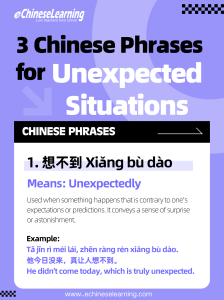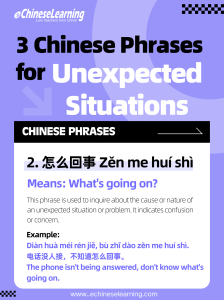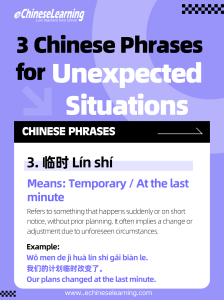In Chinese communication, expressing your reaction to unexpected situations can be subtle and nuanced. Let’s explore three common phrases that native speakers use to convey surprise, confusion, or a change of plans, helping you sound more natural and adapt to fluid conversations.
1. 想不到 Xiǎng bù dào — Unexpectedly
Used when something happens that is contrary to one’s expectations or predictions. It conveys a sense of surprise or astonishment.
Example:
Tā jīn rì méi lái, zhēn ràng rén xiǎng bù dào.
他今日没来,真让人想不到。
He didn’t come today, which is truly unexpected.
2. 怎么回事 Zěn me huí shì — What’s going on?
This phrase is used to inquire about the cause or nature of an unexpected situation or problem. It indicates confusion or concern.
Example:
Diàn huà méi rén jiē, bù zhī dào zěn me huí shì.
电话没人接,不知道怎么回事。
The phone isn’t being answered, don’t know what’s going on.
3. 临时 Lín shí — Temporary / At the last minute
Refers to something that happens suddenly or on short notice, without prior planning. It often implies a change or adjustment due to unforeseen circumstances.
Example:
Wǒ men de jì huà lín shí gǎi biàn le.
我们的计划临时改变了。
Our plans changed at the last minute.
Mastering these expressions will enable you to navigate the unexpected with greater ease and confidence in your Chinese conversations. Practice using them in context to enhance your fluency and adapt to various real-life scenarios.
Want to sound more like a native?Try your first free 1-on-1 trial class with a live native Chinese teacher today—get personalized speaking practice that actually sticks!






